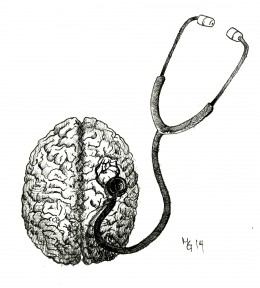
As children, we’re called in to the doctor’s office for a yearly checkup. This is a standard, unquestioned practice to ensure we are physically healthy. Yet, we don’t afford our mental state the same maintenance. Why?
We’re at a point in our lives when intense social, academic and professional pressures come together to wreak havoc on our psyches.
If you sprained your wrist, you wouldn’t be embarrassed to make the hike up to Health Services for treatment. You also wouldn’t be ashamed to ask a friend to accompany you.
But this isn’t the case with mental health. Mental well-being is not treated with the same seriousness and normality as physical health. It’s not that people aren’t aware of mental health issues; it’s how we view them. We, as a society, still view suicide and self-harm as personal choices rather than symptoms of severe health issues. This stigma hurts us all. We see our friends suffer in silence because they don’t think that their problems deserve medical attention.
So how can we make things better?
On campus, we need more help. The University Counseling Center’s resources are simply inadequate. Too many of us and our peers have been turned away too many times because of a lack of space or counselor availability. After you sprained your wrist, Health Services wouldn’t tell you to wait three to six weeks for an email to tell you whether or not you can be seen. When the Counseling Center turns students away like this, it refutes the idea that one’s mental well-being is as pressing as his or her physical health, or as pressing as the wellness of students with more chronic psychological issues.
The University Counseling Center also desperately needs a better location. The Counseling Center could not be more central, located in the lobby of Glenn G. Bartle Library by the flags. While we’d like to see the negative connotations of seeking mental health services disappear, we’re not there yet. This means it’s likely that students would neglect to pursue help for fear of being seen walking in or out. In an ideal world, there wouldn’t be anything less “embarrassing” about seeing a therapist for anxiety than going to a doctor if you think you have mono. But until we’re there, moving the facility to a more private location should be paramount.
The reasons for students not to seek help run deeper than just the location of the office, though. For one thing, mental health issues are often difficult to diagnose — you can’t just take a blood test to test for something like anxiety or depression.
Addressing mental health is also challenging because sometimes we won’t even realize that we, or a friend of ours, is suffering. It’s no secret that our addictions to technology make it so that we’re never truly alone. Alone means dealing with the demons we’re suppressing, instead of fighting them. Instead, we’ll just distract ourselves with our smartphones. These distractions make it so that we may not even realize we’re exhibiting symptoms of depression until after the fact. Sometimes, this means we’ve lost a month or two. Sometimes, depression is a death sentence.
Instead of seeking help, we may also self-medicate, turning to drinking, drugs and other self-destructive — yet socially acceptable — methods of coping. Sometimes, these are explicitly self-harming. Cutting has been on the rise for years, yet even discussing the matter seriously is unheard of. Other times, we might not always realize or be willing to admit the ways we deal with anxieties: substance abuse, unhealthy eating habits, binge drinking. Worse, our culture ambiguously promotes behaviors like blacking out, making them all the more common and even encouraged.
We are as worried for students who cut themselves as we are for the ones who regularly get drunk and cry to their suitemates. We’re worried for our friends and for our fellow students, present and future. Mental health has many faces, and Binghamton University needs to start addressing all of them.


